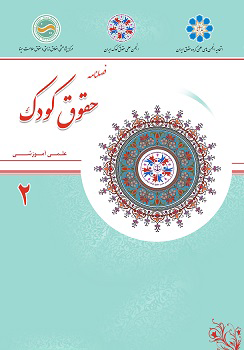بررسی تطبیقی قوانین حمایتی اطفال و نوجوانان در ایران و مصر
محورهای موضوعی : child rights
1 - استادیار، گروه آموزشی حقوق جزا و جرمشناسی، دانشکده حقوق و علوم سیاسی، دانشگاه علامه طباطبایی، تهران، ایران
2 - دانشجوی کارشناسی ارشد حقوق کیفری اطفال و نوجوانان، دانشگاه علامه طباطبایی، تهران، ایران
کلید واژه: مسؤولیت کیفری, اطفال و نوجوانان, ایران, مصر, اسناد بینالمللی,
چکیده مقاله :
پژوهش حاضر با مطالعه قوانین و مقررات ایران و مصر راجع به کودکان و نوجوانان و اسناد و موازین بینالمللی از جمله کنوانسیون حقوق کودک و مقررات پکن به تطبیق موضوعاتی چون قوانین حمایتی راجع به اطفال و نوجوانان در ایران و مصر، حداقل و حداکثر سن مسؤولیت کیفری، نوع و میزان مسؤولیت کیفری در دورههای سنی مختلف در دو کشور ایران و مصرپرداخته است و با تحلیل و بررسی موضوعات مذکور میزان انطباق دو کشور ایران و مصر با موازین بینالمللی را مورد مداقه قرار داده است. حاصل پژوهش این است که کشور ما در تدوین قوانین حمایتی اطفال و نوجوانان اصول قانوننویسی رعایت نشده است، وضع قوانین متعدد و پراکنده در قبل و بعد از انقلاب اصل قابل دسترسبودن قوانین را مخدوش نموده است و این موضوع حمایت از کودکان و نوجوانان را با مشکل مواجه میکند و مانع تحقق عدالت است. در قانون مصر حداقل سن مسؤولیت کیفری را در تمام جرائم 12 سال و حداکثر سن مسؤولیت کیفری 18 و سن رشد در معاملات مدنی را 21 سال تمام میلادی است، در حالی که قانون ما با توجه به تقسیمبندی جرائم به حدود، قصاص و تعزیرات رویکرد یکسانی نسبت به حداقل و حداکثر سن مسؤولیت کیفری نداشته و این اقدام مخالف صریح مقررات بینالمللی است.
This study was conducted by reviewing the laws and regulations of Iran and Egypt concerning children and adolescents, and also international standards such as the Convention on the Rights of the Child and the Beijing Rules as well to compare and analyze issues including children and adolescents protection rules in Iran and Egypt, the minimum and maximum age of criminal responsibility, type and extent of criminal responsibility in different age groups in both Iran and Egypt. Then, the extent of compliance of two countries rules with international rules was assessed. Our results revealed that Iran has not complied with the principles of legislation in drafting the protection laws for children and adolescents. The adoption of numerous and dispersed laws in the pre and post revolution has undermined the principle of accessibility of the law, then these circumstances make it difficult to protect children and adolescents with It is a problem and finally prevent the realization of access to justice. In Egypt, the minimum and maximum age for criminal responsibility is 12 and 18 years, respectively, also the minimum age of civilian custody is 21 years, while in Iran’s law, there is not the same approach regarding minimum and maximum age of criminal responsibility due to punishments of crimes are classified into discretionary, retaliate. This result has controversy with international regulations.
